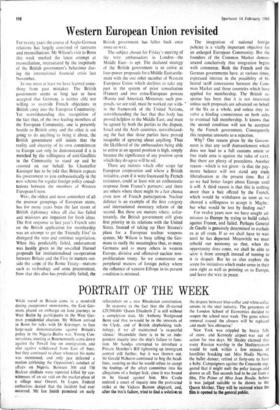Western European Union revisited
For twenty years the course of Anglo-German relations has largely consisted of tantrums and reconciliations. Mr Wilson's visit to Bonn this week marked the latest attempt at reconciliation, necessitated by the ineptitude of the British government's behaviour dur- ing the international financial crisis last November.
In one sense at least we have learned some- thing from past mistakes. The British government seems at long last to have accepted that Germany is neither able nor willing to override French objections to British entry into the European Community. Yet notwithstanding this recognition of the fact that, of the two leading members of the European Community, one is presently hostile to British entry and the other is not going to do anything to bring it about, the British government still insists that the reality and sincerity of its own commitment to Europe can only be demonstrated if it is matched by the willingness of anti-Gaullists in the Community to stand up and be counted on our behalf. So Chancellor Kiesinger has to be told that Britain expects his government to join enthusiastically in the new scheme for regular foreign policy consul- tations between the members of Western European Union.
WEU, the oldest and most somnolent of all the postwar groupings of European states, has for many years been the last resort of British diplomacy when all else has failed and ministers are impatient for fresh ideas. The first response to last year's French veto on the British application for membership was an attempt to get the 'Friendly Five' to disregard the veto and continue negotiation. When this predictably failed, endorsement was hastily given to the so-called Harmel proposals for institutionalised co-operation between Britain and the Five in matters out- side the scope of the Rome Treaty—matters such as technology and arms procurement. Now that this also has predictably failed, the British government has fallen back once more on WEU.
The subject chosen for Friday's meeting of the WEU ambassadors in London—the Middle East—is apt. The declared strategy of the British government is to arrive at four-power proposals fora Middle East settle- ment with the one other member of Western European Union which declines to take any part in the system of prior consultation (France) and two extra-European powers (Russia and America). Moreover, such pro- posals, we are told, must be worked out with- in the framework of the United Nations, notwithstanding the fact that that body has proved helpless in the Middle East; and must he agreed by both the parties to the dispute, Israel and the Arab countries, notwithstand- ing the fact that those parties have proved incapable of agreeing about anything. Thus the likelihood of the ambassadors being able to arrive at an agreed position is high, simply because the significance of any position upon which they do agree will be nil.
There are matters which offer scope for European cooperation and where a British initiative, even if it were frustrated by French resistance, could at least win an enthusiastic response from France's partners; and there are others where there might be a fair chance even now of French participation. Nuclear defence is an example of the first category and international monetary reform of the second. But these are matters where, unfor- tunately, the British government still gives first priority to its relations with the United States. Instead of taking up Herr Strauss's plans for a European nuclear weapons system, Mr Wilson is busy telling the Ger- mans to ratify the meaningless (but, to many Germans and to many others in western Europe, divisive and offensive) nuclear non- proliferation treaty. So we concentrate on peripheral matters of foreign policy where the influence of western Etirope in its present condition, is minimal. The integration of national foreign policies is a vitally important objective for an enlarged European Community. But the founders of the Common Market demon- strated conclusively that integration begins with commerce. Both the French and the German governments have, at various times, expressed interest in the possibility of bi- lateral tariff concessions between the Com- mon Market and those countries which have applied for membership. The British re- sponse has been that it is not interested • unless such proposals are advanced on behalf of the Six as a whole, and unless they in- volve a binding commitment on both sides to eventual full membership. It knows that the second condition will not be accepted by the French government. Consequently this response amounts to a rejection.
Why? One reason given by the Govern- ment is that any tariff dismantlement which does not lead to a full customs union or free trade area is against the rules of GATT. But there are plenty of precedents. Another reason—which is not given—is that the pay- ments balance will not stand any trade liberalisation at the present time. But if so we had better forget about Europe until it will. A third reason is that this is nothing more than a bait offered by the French, which would be withdrawn as soon as we showed a willingness to accept it. Maybe: but what would be lost by finding out?
For twelve years now we have sought ad- mission to Europe by trying to build cabals against France, and failed. Perhaps General de Gaulle is genuinely determined to exclude us at all costs. If so we shall have to wait until be has departed. Meanwhile we must rebuild our economy so that, when the opportunity does come, we shall be able to seize it from strength instead of turning to It in despair. But let us also explore the scope for initiatives which make sense in their own right as well as pointing us to Europe, and leave the WEU in peace.


































 Previous page
Previous page